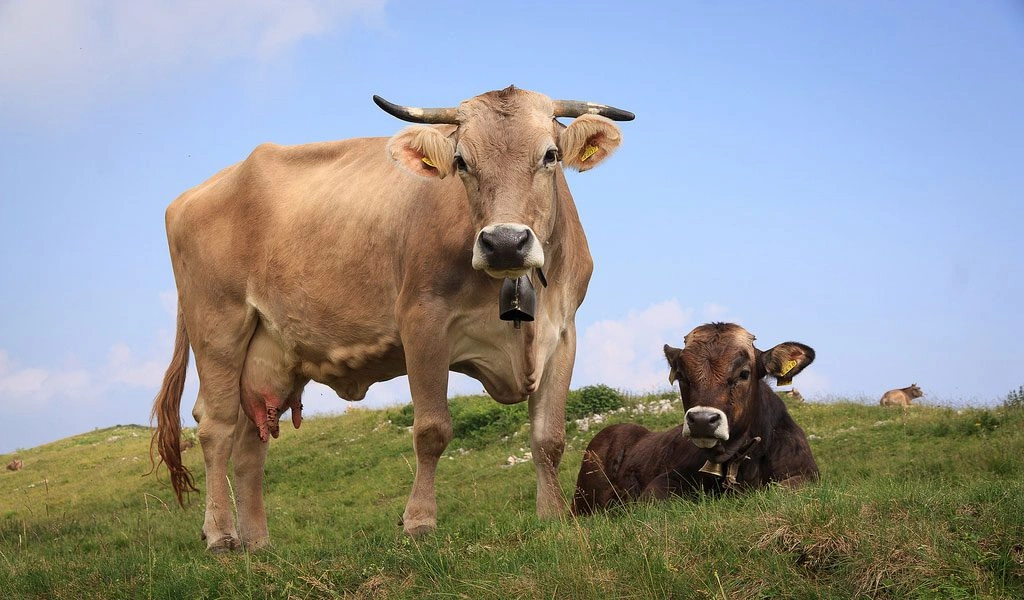Just Like Us
Last week I found myself standing in the middle of our pasture at sunrise. I was watching our milk cow Oakley teach her calf how to graze. Not where to graze—that’s pretty obvious even to a baby cow—but how to graze. The calf learned how to wrap her tongue around the best grass, how to chew it properly, and how to move methodically through a patch instead of wandering aimlessly.
It struck me as I watched this patient education session. Oakley was doing exactly what I do every morning when I teach my kids to collect eggs or milk the goats. She was passing down essential life skills. She was showing her offspring how to thrive in their environment.
And that’s when it hit me: animals are just like us.
Not in the sentimental, Disney movie way where they have human emotions. They don’t solve problems through the power of friendship. But in the real, practical, observable ways that we somehow forgot to notice.
We’ve created this massive separation between humans and animals. We act like we’re operating on completely different planes of existence. But the more time I spend with our livestock, the more I realize how similar our basic needs and behaviors really are.
Watch animals long enough, and you’ll start recognizing patterns that feel eerily familiar.
Our chickens have a complex social hierarchy that makes high school drama look simple. There’s always one hen who thinks she runs the show, a few middle-management types who try to keep the peace, and inevitably one or two outcasts. They get picked on for mysterious reasons that seem completely arbitrary to outside observers.
Sound familiar?
Our horses have distinct personalities that would fit right into any workplace. There’s the overachiever who always tries too hard, the lazy one who does the minimum required effort, and the anxious one who worries about everything. Then there’s the natural leader. Everyone instinctively follows them.
You could map these same personality types onto any human organization and they’d fit perfectly.
But here’s what really gets me: we’ve somehow convinced ourselves that because we can use smartphones and build skyscrapers, we’ve transcended our animal nature. We act like we’re above the basic biological needs and social patterns. These patterns govern every other living creature on the planet.
This is complete nonsense, and it’s making us miserable.

Modern life has disconnected us from our animal selves. This would have seemed insane to our ancestors. We’ve forgotten that we’re mammals with mammalian needs. We try to force ourselves into artificial environments and social structures that ignore our basic biology.
We sit inside under artificial lighting for most of our lives, eating processed food that barely resembles what it came from. We’re surrounded by strangers, completely disconnected from natural cycles and seasonal rhythms.
Then we wonder why anxiety and depression rates are through the roof.
Animals don’t have anxiety disorders in the wild.
But put them in unnatural environments—factory farms, tiny cages, artificial lighting—and suddenly they develop all kinds of behavioral and health problems. These problems look remarkably similar to human issues.
Maybe there’s a connection here that we’re too proud to acknowledge.
I’m not suggesting we all need to go live in caves. Nor do I suggest we hunt our dinner with spears. But I am suggesting that we might want to pay attention to what makes our animals thrive. Perhaps we should see if any of it applies to us.
Our animals need fresh air, natural movement, real food, social connection, meaningful work, and respect for their individual nature. When they get these things, they’re healthy, content, and productive.
When they don’t get these things, they get sick, anxious, aggressive, or depressed.
Hmm.
What would happen if we applied the same principles to human life? What if we prioritized fresh air over climate-controlled buildings? Natural movement over gym memberships? Real food over processed convenience? Genuine community over social media connections?
What if we stopped trying to override our basic mammalian needs and started honoring them instead?
I know this sounds radical in our hyper-technological world. However, watching animals has taught me something important: there’s wisdom in working with natural systems instead of against them.
Our animals don’t need complicated self-help programs or expensive therapy to be content.
Give them these things, and they flourish. Deny them these things, and they develop all kinds of problems that no amount of medication can fix.
Maybe it’s time we stopped acting like we’re so different from the animals we share this planet with. Maybe it’s time we acknowledged that we’re animals too—sophisticated ones, but animals nonetheless—with animal needs that can’t be ignored without consequences.
The next time you’re feeling anxious, depressed, or generally disconnected from life, try thinking like an animal.
Have you honoured your basic mammalian needs, or have you been trying to survive on artificial substitutes?
I’m not saying this will solve all of life’s problems. But I am saying that maybe there’s something to learn from creatures. They seem to have figured out how to be content without apps, antidepressants, or self-help books.
Maybe they’re not so different from us after all. Maybe we’re more like them than we want to admit.
And maybe that’s not something to be embarrassed about…maybe it’s something to embrace.

Leave a Reply